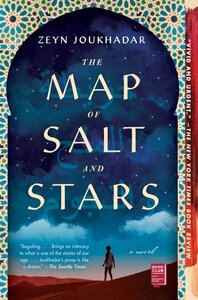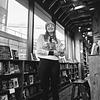Take a photo of a barcode or cover
Beautifully written book weaving together a legend with a modern day refugee story.
A wonderful story. I say wonderful mainly in reference to the way the ancient story of Rawiya parallels the present-day story of Nour and her family... because Nour’s story is obviously tragic in itself. Although it’s fiction, I think it raises some necessary awareness of the obstacles refugees face in war-ridden countries, especially Syria. It may just be the most beautifully-written descriptive book I’ve ever read. The way Nour’s synesthesia and inner thoughts are blended with the maps and poetry, I mean, truly beautiful. And it’s all told from the perspective of a young adolescent girl... such an interesting perspective. The first few chapters were a bit slow, that’s my only qualm.
I had seen this book scrolling through GoodReads, but honestly it hadn't really spoken to me as something I should pick up. I ended up getting a digital copy of it through a subscription that I have and wow, am I glad I did.
This was a harrowing but meaningful story beautifully told. The author's and one of the character's synesthesia made for rich descriptions of everything from the color of someone's speaking voice, to the interplay of color, feeling, and ambiance throughout the Middle East.
The story keeps moving on two separate tracks, Nour's and Rawiya's. Nour's story is in present day as she and her family try to escape the conflicts in Syria and elsewhere. Their journey is set against the backdrop of her lingering grief at losing her father, her Baba, as well as against the parallel of Rawiya's journey, which was a fable or mythology her father would share with her. Both characters travel similar paths, slaying the troubles before them.
The novel is propulsive but reflective at the same time. There's great heartbreak, but also growth and understanding. This story will stay with me for a long time.
This was a harrowing but meaningful story beautifully told. The author's and one of the character's synesthesia made for rich descriptions of everything from the color of someone's speaking voice, to the interplay of color, feeling, and ambiance throughout the Middle East.
The story keeps moving on two separate tracks, Nour's and Rawiya's. Nour's story is in present day as she and her family try to escape the conflicts in Syria and elsewhere. Their journey is set against the backdrop of her lingering grief at losing her father, her Baba, as well as against the parallel of Rawiya's journey, which was a fable or mythology her father would share with her. Both characters travel similar paths, slaying the troubles before them.
The novel is propulsive but reflective at the same time. There's great heartbreak, but also growth and understanding. This story will stay with me for a long time.
Two stories of young girls interwoven together - Nour, who moves from New York back home to Syria with her family in 2011 just before war breaks out - and Rawiya, who leaves home to explore the world hundreds of years ago. The 2 storylines felt choppy & it was hard for me to stick with the book. Took me a while to finish. Imagery was beautiful though
I read this on my Kindle as a library book and halfway through I had to order a real copy so I can reread it and mark up passages of the beautiful language.
The novel tells the story of a contemporary Syrian-American girl, Nour, caught up in the wars in the Middle East and blends in the story of Rawiya, a character from a story Nour's late father had told her. Rawiya disguised herself as a boy and apprenticed with a famous mapmaker. Nour's mother is a mapmaker too. The two stories combine to explore the power of place, of stories, and of home.
The novel tells the story of a contemporary Syrian-American girl, Nour, caught up in the wars in the Middle East and blends in the story of Rawiya, a character from a story Nour's late father had told her. Rawiya disguised herself as a boy and apprenticed with a famous mapmaker. Nour's mother is a mapmaker too. The two stories combine to explore the power of place, of stories, and of home.
3.5 Stars
"I think about how much faith people had to have back then to trust the stars would be there when they needed them to, to trust the sky wouldn't fail them."
"People always think dying is going to hurt. But it does not. It's the living that hurts us."
"Time crumbles everything. I try to picture it like it was once, the paint smooth, the stones polished. People make such beautiful things, I think, even though they destroy so much."
"I wonder if almost can cost you as much as did, if the real wound is the moment you understand you can do nothing."
"Some people are born knowing they have to fill those places in...They are born with a wound, and they know from the beginning that if they don't find the story that belongs to them, that wound will never heal...Others take a long time to figure that out."
This is a beautiful story of family, faith, and the meaning of home. I think this would be a great book for a book club or a classroom, as the language is easy to understand and yet powerful.
What I liked: Joukhadar writes two stories that mirror each other in their journeys across the Middle East, Northern Africa, and Spain. I loved both of them, though they are also vastly different; one is the story of a girl who disguises herself as a boy to become a mapmaker's apprentice circa the 12th century and the other is of a girl and her family who are trying to escape war and pain in 2011. Also - the poems at the beginning of each part/country are breathtaking and I think those were actually my favorite parts of the book...if Joukhadar had a book of poetry written in that style, I would buy it in a heartbeat.
What I didn't like: This may be me but, while I loved certain lines from this story (I know I quoted a LOT above), the dialogue and action scenes just weren't clicking with me. The internal monologue was beautiful and I loved seeing all these worlds from a little girl's eyes, but I wasn't feeling most of the writing.
"I think about how much faith people had to have back then to trust the stars would be there when they needed them to, to trust the sky wouldn't fail them."
"People always think dying is going to hurt. But it does not. It's the living that hurts us."
"Time crumbles everything. I try to picture it like it was once, the paint smooth, the stones polished. People make such beautiful things, I think, even though they destroy so much."
"I wonder if almost can cost you as much as did, if the real wound is the moment you understand you can do nothing."
"Some people are born knowing they have to fill those places in...They are born with a wound, and they know from the beginning that if they don't find the story that belongs to them, that wound will never heal...Others take a long time to figure that out."
This is a beautiful story of family, faith, and the meaning of home. I think this would be a great book for a book club or a classroom, as the language is easy to understand and yet powerful.
What I liked: Joukhadar writes two stories that mirror each other in their journeys across the Middle East, Northern Africa, and Spain. I loved both of them, though they are also vastly different; one is the story of a girl who disguises herself as a boy to become a mapmaker's apprentice circa the 12th century and the other is of a girl and her family who are trying to escape war and pain in 2011. Also - the poems at the beginning of each part/country are breathtaking and I think those were actually my favorite parts of the book...if Joukhadar had a book of poetry written in that style, I would buy it in a heartbeat.
What I didn't like: This may be me but, while I loved certain lines from this story (I know I quoted a LOT above), the dialogue and action scenes just weren't clicking with me. The internal monologue was beautiful and I loved seeing all these worlds from a little girl's eyes, but I wasn't feeling most of the writing.
Wowsers! Beautiful, poignant, lyrical storytelling.
This was such an interesting, sad, and important book. It's crazy to me that this is "historical fiction", but happened within my lifetime (in the 2000s) and that I never learned about it in school. I enjoyed the way that the story was told in switching back and forth between Nour's real life and one of her childhood stories.
"The Map of Salt and Stars" is a novel that follows the parallel journeys of two girls across different timelines. One story is set in contemporary Syria, where Nour, a young girl, and her family embark on a perilous journey in the midst of civil war. The other narrative unfolds in the 12th century and follows Rawiya, a legendary apprentice to a mapmaker, as she traverses the world. The novel weaves together themes of family, loss, identity, and the enduring power of storytelling across generations and cultures.
My favorite quotes:
"The Map of Salt and Stars" is a novel that follows the parallel journeys of two girls across different timelines. One story is set in contemporary Syria, where Nour, a young girl, and her family embark on a perilous journey in the midst of civil war. The other narrative unfolds in the 12th century and follows Rawiya, a legendary apprentice to a mapmaker, as she traverses the world. The novel weaves together themes of family, loss, identity, and the enduring power of storytelling across generations and cultures.
My favorite quotes:
“I am a woman and a warrior. If you think I can't be both, you've been lied to.”
“The most important places on a map are the places we haven't been yet”
“You are the stories you tell yourself.”
Read for the 2020 read harder challenge Read a book by or about a refugee.




